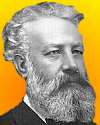 (source)
(source)
|
Jules Verne
(8 Feb 1828 - 24 Mar 1905)
French author who was a pioneer in science fiction with such novels as Journey to the Centre of the Earth (1864), Twenty Thousand Leagues Under the Sea and From Earth to the Moon.
|
Science Quotes by Jules Verne (11 quotes)
La science, mon garçon, est faite d’erreurs, mais d’erreurs qu’il est bon de commettre, car elles mènent peu à peu à la vérité.
Science, my boy, is composed of errors, but errors that it is right to make, for they lead step by step to the truth.
Science, my boy, is composed of errors, but errors that it is right to make, for they lead step by step to the truth.
— Jules Verne
Journey to the Centre of the Earth, translated by William Butcher (1992, 2008), 146.
Le grand architecte de l'univers l'a construite on bons matériaux.
The Great Architect of the universe built it of good firm stuff.
The Great Architect of the universe built it of good firm stuff.
— Jules Verne
Journey to the Centre of the Earth, translated by William Butcher (1992)
On peut braver les lois humaines, mais non résister aux lois naturelles.
One can defy human laws, but cannot resist natural laws.
One can defy human laws, but cannot resist natural laws.
— Jules Verne
Original French in Les Voyages Extraordinaires par Jules Verne: Vingt Mille Lieues Sous Les Mers (1870), 359. (Twenty Thousand Leagues Under the Sea). Translation by Webmaster. The context is that Captain Nemo is describing how the submarine Nautilus had been trapped as a melting iceberg flipping to find a new equilibrium. Nemo regarded the accident as caused by “a caprice of nature, not from the ignorance of man.”
Aluminum is at once as white as silver, as incorrodible as gold, as tenacious as iron, as fusible as copper, and as light as glass. It is easily worked; it is widely spread in nature, alumina forming the bases of most rocks; it is three times lighter than iron; in short, it seems to have been created expressly to furnish material for our projectile!
— Jules Verne
Planning a spacecraft to be fired from a cannon to the moon. In From the Earth to the Moon (1865, 1890), 38.
I consider [H. G. Wells], as a purely imaginative writer, to be deserving of very high praise, but our methods are entirely different. I have always made a point in my romances of basing my so-called inventions upon a groundwork of actual fact, and of using in their construction methods and materials which are not entirely without the pale of contemporary engineering skill and knowledge. ... The creations of Mr. Wells, on the other hand, belong unreservedly to an age and degree of scientific knowledge far removed from the present, though I will not say entirely beyond the limits of the possible.
— Jules Verne
Gordon Jones, 'Jules Verne at Home', Temple Bar (Jun 1904), 129, 670.
I did not expect to find the electric cable in its primitive state, such as it was on leaving the manufactory. The long serpent, covered with the remains of shells, bristling with foraminiferae, was encrusted with a strong coating which served as a protection against all boring mollusks. It lay quietly sheltered from the motions of the sea, and under a favorable pressure for the transmission of the electric spark which passes from Europe to America in .32 of a second. Doubtless this cable will last for a great length of time, for they find that the gutta-percha covering is improved by the sea water.
[Referring to the Transatlantic telegraph cable laid in 1866, as viewed from the fictional submarine Nautilus.]
[Referring to the Transatlantic telegraph cable laid in 1866, as viewed from the fictional submarine Nautilus.]
— Jules Verne
Twenty Thousand Leagues Under The Seas, (1874), 285. Translated from the original French edition, Vingt Mille Lieues Sous Les Mers (1870).
I do not see the possibility of comparison between his [H. G. Wells] work and mine. We do not proceed in the same manner. It occurs to me that his stories do not repose on a very scientific basis. ... I make use of physics. He invents. I go to the moon in a cannon-ball, discharged from a cannon. Here there is no invention. He goes to Mars in an airship, which he constructs of a metal which does not obey the law of gravitation. Ça c'est très joli ... but show me this metal. Let him produce it.
— Jules Verne
Quoted in R. H. Sherard, 'Jules Verne Re-Visited', T.P.'s Weekly (9 Oct 1903).
I have always fancied that the end of the world will be when some enormous boiler, heated to three thousand millions of atmospheric pressure, shall explode and blow up the globe. ... They [the Americans] are great boilermakers.
— Jules Verne
Five Weeks in a Balloon (1863, 1962), 100.
I wanted to see what no one had yet observed, even if I had to pay for this curiosity with my life.
— Jules Verne
Twenty Thousand Leagues Under the Sea translated by Walter James Miller and Frederick Paul Walter (1870). In Gary Westfahl, Science Fiction Quotations: From the Inner Mind to the Outer Limits (2006), 116.
The sole precoccupation of this learned society was the destruction of humanity for philanthropic reasons and the perfection of weapons as instruments of civilization.
— Jules Verne
From the Earth to the Moon, translated by Walter James Miller (1978)
When first discovered, [aluminum was a precious metal that] cost about 270 dollars a pound; then it fell to 27 dollars, and today a pound of aluminum is worth about nine dollars.
— Jules Verne
Answering the question, “Is not aluminum rather expensive?” to a fictional moon shot committee. In Jules Verne, Aaron Parrett (ed.) and Edward Roth (trans.), From the Earth to the Moon (1865, 2005), 50. In the original French edition, the costs were given in francs as about 1500, 150 and 48.75, respectively.
Quotes by others about Jules Verne (3)
I'm sure we would not have had men on the Moon if it had not been for Wells and Verne and the people who write about this and made people think about it. I'm rather proud of the fact that I know several astronauts who became astronauts through reading my books.
Address to US Congress, 1975. Science and Technology Committee, United States Congress, House, Future Space Programs, 1975, Hearings Before the Subcommittee on Space Science and Applications (1975), 206. Also in Arthur C. ClarkeThe View from Serendip (1977), 238.
I do not remember how it got into my head to make first calculations related to rocket. It seems to me the first seeds were planted by famous fantaseour, J. Verne.
As quoted, without source, in LIFE: 100 People Who Changed the World (2010), 94.
Memories of childhood are unreliable. I am lucky to have documentary evidence dating from the age of nine. The evidence is an unfinished novel, found among my mother's papers forty-three years later, with the title Sir Phillip Roberts’ Ero-Lunar Collision. Sir Phillip is a professional astronomer, evidently a role model for a young scientist. The style of the novel is copied from Jules Verne; the story was suggested by the near approach of the asteroid Eros in the year 1931. Here is a sample of the dialogue:
“Will Eros really go right through our Sattelite?” said Major Forbes.
“Yes,” said Sir Phillip, “its speed, and its small weight and resistance, will bring it through our Sattelite, it will be a picture, suddenly rising white-hot from the Moon’s internal fires, followed by a stream of liquid lava.”
So it was Jules Verne and Eros that turned my infant thoughts to science.
“Will Eros really go right through our Sattelite?” said Major Forbes.
“Yes,” said Sir Phillip, “its speed, and its small weight and resistance, will bring it through our Sattelite, it will be a picture, suddenly rising white-hot from the Moon’s internal fires, followed by a stream of liquid lava.”
So it was Jules Verne and Eros that turned my infant thoughts to science.
Giving his own reason, in 'Seventy-Five Reasons to Become a Scientist', American Scientist (Sep-Oct 1988), 76, No. 5, 450. Dyson gives more background details in 'Preface', From Eros to Gaia (1992), viii. Dyson included all of his unfinished childhood novel as Chap. 1 of the same book, p.3-7. Note the word 9-yr-old Dyson knew in 1933, “Sattelite” [sic].

 In science it often happens that scientists say, 'You know that's a really good argument; my position is mistaken,' and then they would actually change their minds and you never hear that old view from them again. They really do it. It doesn't happen as often as it should, because scientists are human and change is sometimes painful. But it happens every day. I cannot recall the last time something like that happened in politics or religion.
(1987) --
In science it often happens that scientists say, 'You know that's a really good argument; my position is mistaken,' and then they would actually change their minds and you never hear that old view from them again. They really do it. It doesn't happen as often as it should, because scientists are human and change is sometimes painful. But it happens every day. I cannot recall the last time something like that happened in politics or religion.
(1987) -- 


